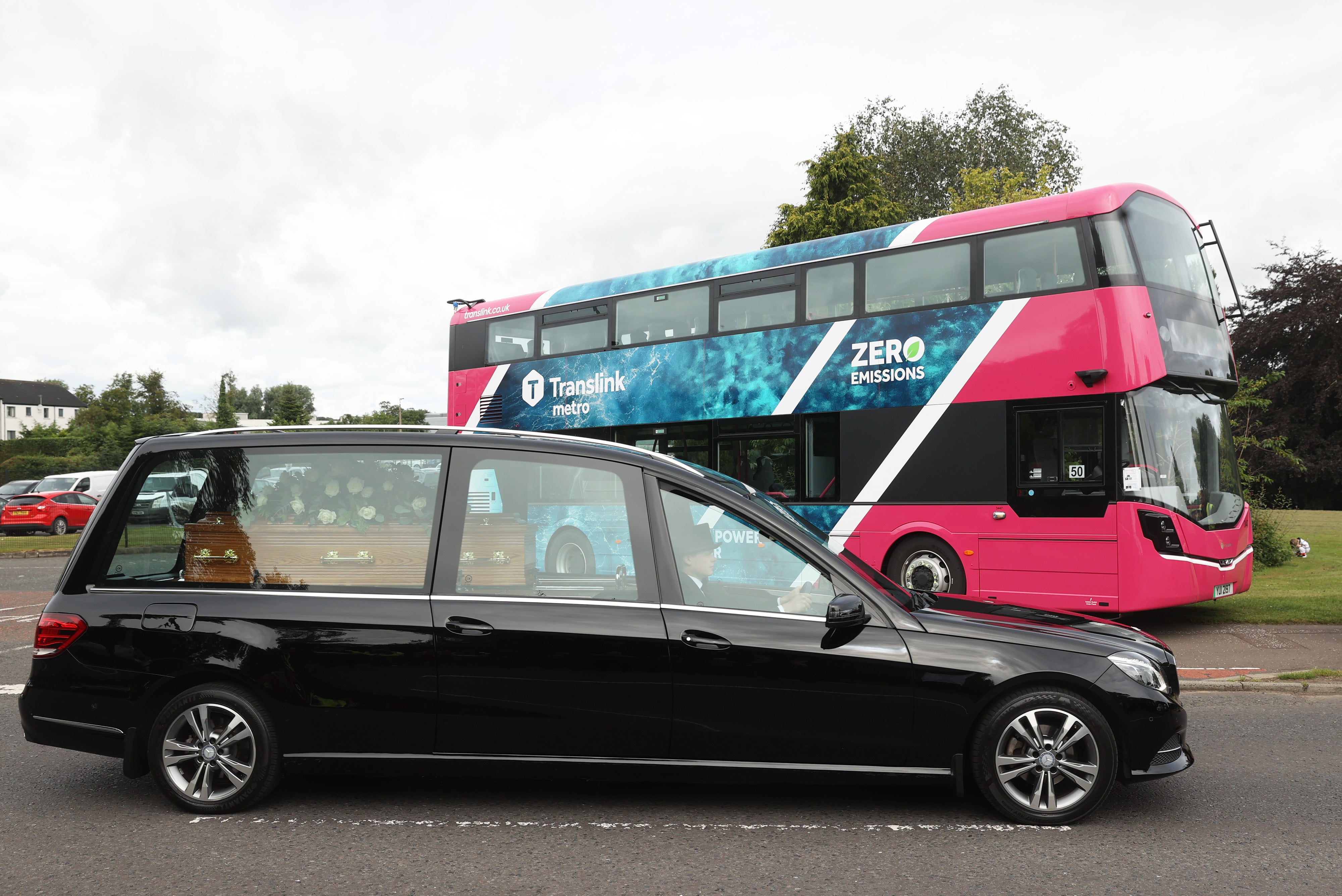Sir William Wright remembered as ‘genius who followed his dreams’
Hundreds of employees of Wrightbus in Ballymena formed a guard of honour outside the factory in tribute to the company’s founder.

Sir William Wright was an innovator and a genius who followed his dreams, his son has told mourners.
Pastor Jeff Wright said his father had stood up against terrorism and gave much of his life to trying to improve Northern Ireland.
Earlier, hundreds of employees of Wrightbus in Ballymena formed a guard of honour outside the factory in tribute to founder Sir William.
Tributes have poured in after the death of the 94-year-old at the weekend.
Sir William founded the firm in Co Antrim with his father Robert after the Second World War. He also served as a unionist councillor until 2005.
It was the first company in the UK to produce an electric bus.
Some people dream of making a difference while others stay awake and do it. My dad was one of those who stayed awake and did it
At a service of thanksgiving for his life at Green Pastures Church in Ballymena, Mr Wright paid tribute to his father.
He said: “My father was a lot of things to a lot of people, but to us he was dad, he was granda and great granda.
“And yet we were all aware of the largeness of who he was.
“Dad was a storyteller, a leader, a creator and an inventor.
“He was an adventurer and a genius.”
Mr Wright told how his father and grandfather had started the firm that was to have global success.
He said: “It was at his father’s house on Gordon Street that dad and his father Robert built the now famous tin shed.
“Dad had an ability to see and to dream and to understand where a market and where the technology was going.
“He read at least 20-30 industry magazines every week and had the courage of his convictions to follow those ideas and those dreams.
“We have a saying here in Green Pastures, some people dream of making a difference while others stay awake and do it.
“My dad was one of those who stayed awake and did it.”
Mr Wright told how his father entered politics at the height of the Troubles in Northern Ireland.
“He loved his country,” he said.
“He became a councillor in Ballymena, then he was elected as a member of Stormont.
“He gave so much of his life for the betterment of Northern Ireland and for the people of the town.
“But it was then that we as a family had to deal with the death threats from the IRA, and I remember as a young teenager lying awake at night worrying, doing lookout and waiting until he came home in case he would be murdered at the front door.
“Here I saw him display the courage of his convictions and he stood up against terrorism and was never afraid to make a stand for what he believed.”
He added: “Dad never did care much for money, it was never his motivation.
“It was always product development and innovation that gave him his thrill.
“That is why Wrightbus became known for its market-leading innovation.
“The first aluminium coach, the first low-floor bus in the UK. He even saw the future need for clean energy for buses in London before London did.
“He built the first zero-emissions vehicle in Britain, then the first battery electric bus, and the first double-decker hydrogen bus in the world.
“All these firsts were to get Wrightbus recognised as leading the way, not just in the British bus industry but in Europe and the Far East and in the world.”
Earlier in the day, Wrightbus management and staff stood together to pay their respects as Sir William’s funeral cortege passed by.
Around 900 workers lined the streets as the cortege slowly passed one of the company’s zero-emission buses.
Wrightbus executive chairman Jo Bamford praised the legacy of Sir William, saying he created the platform for a business which now leads the world.
Chief executive Buta Atwal said the guard of honour was a “fitting tribute” to a man who had put Wrightbus on the map.
“Everyone here at Wrightbus has been saddened by the death of Sir William but they were determined to pay their respects,” he said.
“The guard of honour was our way of thanking him for what he’s done for this business and this whole area, and we hope the family recognise that we will never forget the legacy he has left behind.”
Sir William, a father-of-three, grandfather and great-grandfather, was buried after a private family service.
Wrightbus employs more than 1,000 people at its factory in Ballymena.
Wrightbus built London’s Routemaster double-decker – dubbed the “Boris Bus” – which was ordered by the Prime Minister when he was mayor and chairman of Transport for London, the capital’s public transport operator.
However, it fell into financial difficulties in recent years and was bought by English industrialist Mr Bamford in 2019.
Stormont Economy Minister Gordon Lyons and North Antrim MP Ian Paisley were among those who expressed their sadness at Sir William’s death at the weekend.
Mr Paisley described him as “an entrepreneur without match”, adding: “We will not see his like again.”
Bookmark popover
Removed from bookmarks